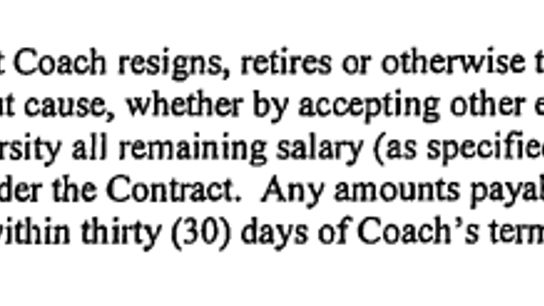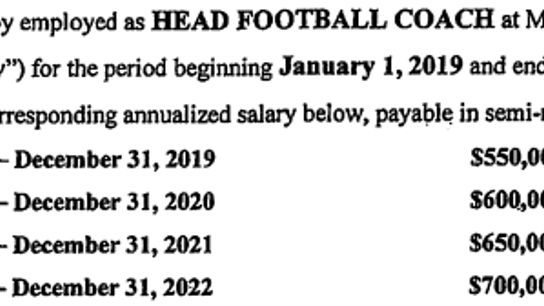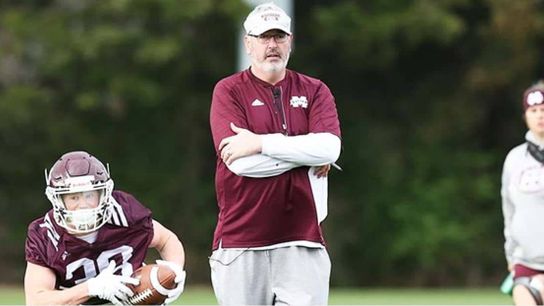Dan Mullen was, in many ways, the best thing to ever happen to Mississippi State football. His 9-season record produced a 69-46 record, a record eight straight bowl appearances and three AP Top 25 finishes. It all crested in 2014, when Mullen led the Bulldogs to a 10-3 record, a second-place finish in the SEC West, an Orange Bowl appearance and, for five weeks in October and November, a No. 1 ranking.
For many of those same reasons, Mullen is the worst thing to happen to Mississippi State football -- at least if you're a coach who has to follow him.
That 2014 season was just Mississippi State's second 10-win campaign since 1940. That Orange Bowl trip was the school's seventh New Year's Six appearance, ever. (And that's including three Peach Bowl appearances in the 1990s, when that game was really more of a mid-tier bowl game.) The five weeks State spent at No. 1 are the only five weeks the program has ever spent at No. 1 in the 1,100-odd week history of the AP poll, dating back to 1936.
And yet, well, how would you like to be the one to tell a crowd of hungry mouths that, yes, that ribeye steak was great, but now it's time to go back to dining on sardines and Saltine crackers?
We can argue until the end of time on where Mississippi State should finish in the SEC West but here's where Mississippi State has finished in the SEC West since the conference's divisional split in 1992:
First: 1 (3.7%)
Second: 2 (7.4%)
Third: 2 (7.4%)
Fourth: 8 (29.6%)
Fifth: 4 (14.8%)
Sixth: 10 (37%)
Seventh: 0 (0%)
We've got 27 years of evidence telling us once every five-to-six years Mississippi State can break through and finish second or third, a good year is a fourth place finish, and a bad year is a sixth place finish.
It's just a fact of life that Mississippi State plays in the most competitive division in college football, spends every year of its football life punching above its weight class, with a fan base that understands those limitations but doesn't accept them.
There's nothing wrong with any of that, it's just that, if you're a native Northerner who spent most of your coaching career trawling up and down the Eastern seaboard, you might not want to spend the prime of your coaching career in Starkville, Mississippi. If someone back home calls, you might want to listen.
The Rutgers job is officially open and while Greg Schiano is the first name on the list, there's been increasing chatter -- both from our own sources and among other media reports -- that Joe Moorhead is also a name Rutgers has interest in.
Moorhead was asked about that interest on Tuesday and said this, via the Jackson Clarion-Ledger:
"We ask our players to focus on the task at hand, and right now I'm focused on us getting better tomorrow, us doing a great job of recruiting this weekend and doing what we need to do with the team next week to find a way to beat Tennessee."
That's not, "Yep, I'm on the first plane out to Jersey after the Egg Bowl." But it's definitely not, "I'll be at Mississippi State in 2020" either.
Moorhead played at Fordham and went 38-13 as the Rams' head coach from 2012-15, a run that got him the offensive coordinator job under James Franklin at Penn State.
It case it doesn't quite register in your mind's eye where exactly Fordham happens to be, here's a visual aid.
And here's a second visual aid, just to drive the point home.

This is the point of the presentation where we must pause to acknowledge the obvious.
Rutgers is a worse football program than Mississippi State. Much, much worse, actually. If the goal is to spend as many New Year's Days at the Outback and Gator bowls as possible, leaving Mississippi State and Rutgers is an undeniable step backward.
But the one advantage (other than location) Rutgers has over Mississippi State is Rutgers is a bad program that knows it's bad. Mississippi State is an average program that sees giants everywhere it turns and wonders why it can't be as tall as them.
To put it as bluntly as possible: two straight 6-6 seasons at Mississippi State would get Moorhead run off. Two straight 6-6 seasons at Rutgers would get Moorhead a contract extension, and maybe a statue.
Leaving Starkville for Piscataway would give Moorhead ample opportunity to build his program with his guys, rather than simply trying to keep pace with Dan Mullen's footprints. (To be clear, Moorhead is doing that now at Mississippi State. He's 11-7 to date in Starkville, and sources say the program is incredibly optimistic about the team it's building for future seasons, 2021 specifically. The problem, as we outlined above, is that a peak season for Mississippi State more than likely equates to a third-place finish in the SEC West.)
Furthermore, Moorhead's contract would make him quite approachable for Rutgers. The language of his buyout gives the opposite impression: he'd owe his full salary for the remainder of the contract.

But state law in Mississippi prevents state institutions from awarding contracts longer than four years, and Moorhead's salary is only a fraction of his overall compensation package.

Leaving after this season would cost Moorhead less than $2 million.
I'm not saying Rutgers should hire Joe Moorhead, and I'm not saying Moorhead should leave if offered. But there's so much here that both sides should probably spend a lot of time thinking about it.
As always, stay tuned to The Scoop for the latest. For similar looks at other coaches' contracts, click here.
